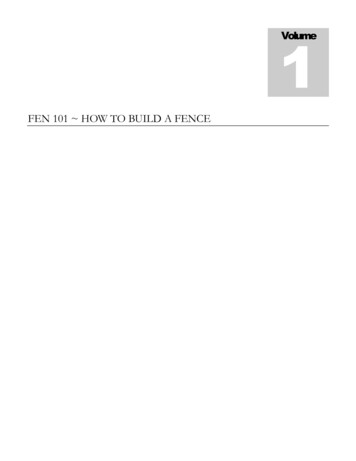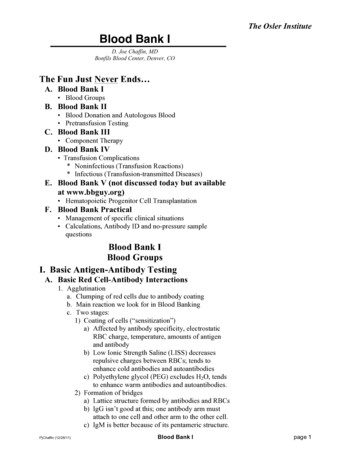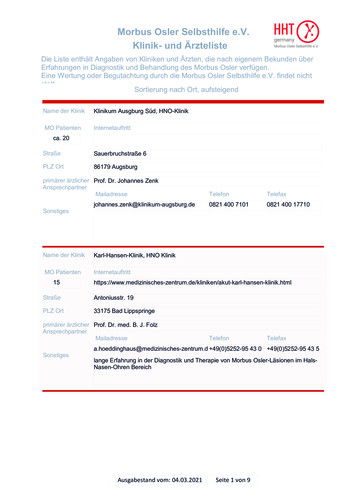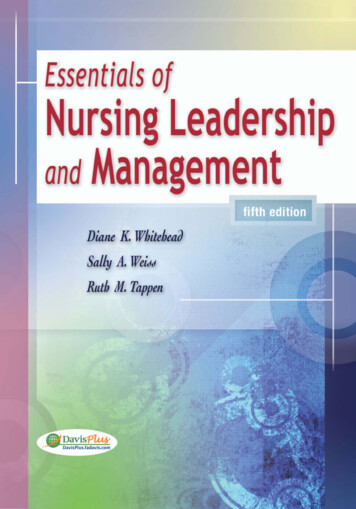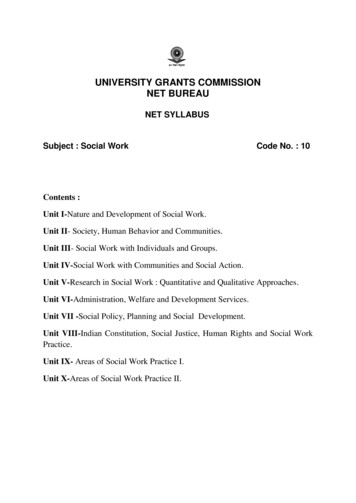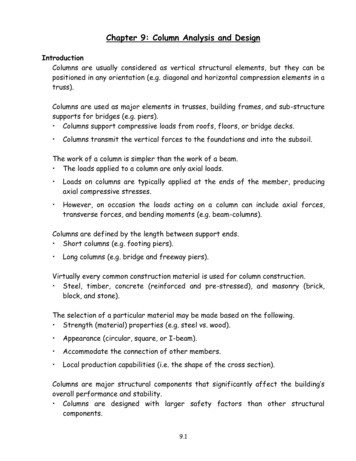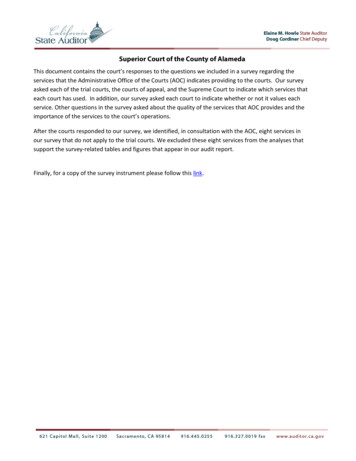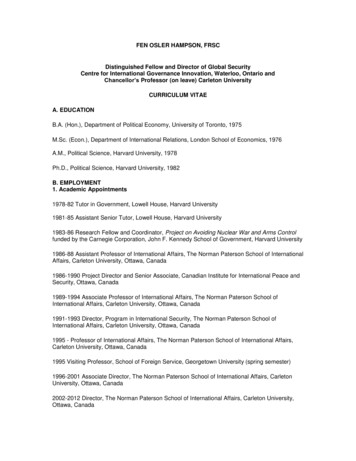
Transcription
FEN OSLER HAMPSON, FRSCDistinguished Fellow and Director of Global SecurityCentre for International Governance Innovation, Waterloo, Ontario andChancellor’s Professor (on leave) Carleton UniversityCURRICULUM VITAEA. EDUCATIONB.A. (Hon.), Department of Political Economy, University of Toronto, 1975M.Sc. (Econ.), Department of International Relations, London School of Economics, 1976A.M., Political Science, Harvard University, 1978Ph.D., Political Science, Harvard University, 1982B. EMPLOYMENT1. Academic Appointments1978-82 Tutor in Government, Lowell House, Harvard University1981-85 Assistant Senior Tutor, Lowell House, Harvard University1983-86 Research Fellow and Coordinator, Project on Avoiding Nuclear War and Arms Controlfunded by the Carnegie Corporation, John F. Kennedy School of Government, Harvard University1986-88 Assistant Professor of International Affairs, The Norman Paterson School of InternationalAffairs, Carleton University, Ottawa, Canada1986-1990 Project Director and Senior Associate, Canadian Institute for International Peace andSecurity, Ottawa, Canada1989-1994 Associate Professor of International Affairs, The Norman Paterson School ofInternational Affairs, Carleton University, Ottawa, Canada1991-1993 Director, Program in International Security, The Norman Paterson School ofInternational Affairs, Carleton University, Ottawa, Canada1995 - Professor of International Affairs, The Norman Paterson School of International Affairs,Carleton University, Ottawa, Canada1995 Visiting Professor, School of Foreign Service, Georgetown University (spring semester)1996-2001 Associate Director, The Norman Paterson School of International Affairs, CarletonUniversity, Ottawa, Canada2002-2012 Director, The Norman Paterson School of International Affairs, Carleton University,Ottawa, Canada
2012- present – Distinguished Fellow and Director of Global Security, Centre for InternationalGovernance Innovation, Waterloo, Ontario, Canada2008 – present - Chancellor’s Professor, Carleton University2010 – Elected Fellow of the Royal Society of Canada2. Other Positions and Affiliations1993-94—Jennings Randolph Peace Fellow, United States Institute of Peace, Washington, D.C.1994-present—Senior Consultant to the United States Institute of Peace, a nonpartisan “think anddo” tank funded by the United States Congress1998-2002—Senior Advisory Board Member, Project on Global Issues, Carnegie Endowment forInternational Peace1997—Consultant to the War-torn Societies Project (WSP). UNRISD, United Nations, Geneva,Switzerland2002-present—Executive Committee Member, Canadian Consortium on Human Security2002-03—Consultant to the United Nations Commission on Human Security, New York2003—Consultant to the International Development Research Centre, Ottawa, Ontario2003-05—Senior Adviser to the Helsinki Process on Globalization and Democracy; and Convener& Chair, Human Security Track. A joint initiative co-chaired by the Foreign Ministers of theGovernment of Finland and the Government of Tanzania2005-present—Designated “Friend of the Helsinki Process”. A joint initiative co-chaired by theForeign Ministers of the Government of Finland and the Government of Tanzania2003-present—Advisory Board Member, Kashmir Study Group, An initiative organized and led byFarooq Kathwari, President, CEO, and Chairman of the Board of Ethan Allen, Inc. (a Track IIinitiative which has been working with the governments of India and Pakistan on their disputeover Jammu-Kashmir)2003- 2006—Executive Committee Member, APSIA (Association of Professional Schools ofInternational Affairs-a U.S.-based organization headed by the Deans & Directors of the world'sleading professional schools of international affairs)2004-2005—Working Group Coordinator, International Institutions and Content Coordinator onInternational Cooperation, International Summit on Democracy, Terrorism, and Security, Madrid,Spain, March 8-11, 20052005-2008—Member, American Political Science Association Task Force on Civil Conflict,Political Violence, and Terrorism2005-2011—Board Member, Lester B. Pearson Peacekeeping Centre2005-2011—Finance Committee, Lester B. Pearson Peacekeeping Centre2
2008-10—Vice-Chair, Lester B. Pearson Peacekeeping Centre2006-2012—Board Member, Social Sciences Foundation (equivalent to a Board of Overseers),Joseph Korbel School of International Studies, University of Denver, Denver, Colorado2006-present—Series Editor, Conflict Management and Security Studies, Routledge Publishers2008-09 – Co-chair (with Derek Burney), Blueprint for Canada-US Engagement Under a New USAdministration, a major study that has been conducted for and delivered to Canada’s PrimeMinister on the future of Canada-US relations under President Obama2009 –present - Board Member, Parliamentary Centre, Ottawa, Canada2009 – Steering Committee, Processes of International Negotiation Group (PIN), InternationalInstitute of Applied Systems Analysis, Laxenburg (Vienna), Austria2009 – Program Committee Member, American Political Science Association2009-12 – International Studies Association Nominating Committee for the ISA Executive2010 – Co-convener (with Dr. Taeho Bark, Seoul National University), Canada-Korea G20 Highlevel Working Group and Seminar. An initiative supported by the Government of Canada and theOffice of the President, Government of the Republic of Korea2010 – Member of the Founding Editorial Board, Oxford Bibliographies Online, Oxford UniversityPress2011 – Co-Chair with Ambassador Paul Heinbecker and Professor Meliha Altunisik, ConstructivePowers Initiative, Istanbul, Turkey, June 1-2, 2011.2011-12 – Co-chair and Moderator, Winning in a Changing World. Project on EnhancingCanada’s Engagement with Emerging Markets.2011- present – International Affairs Columnist, iPolitics, Canada’s leading online source onCanadian politics, business, and international affairs (write a weekly column).2009-present – International Affairs Columnist for Diplomat and International Canada Magazine.Published every three months.1996-present – Co-editor and co-author with former US Assistant Secretary of State, ChesterCrocker, and Senior Vice President of the United States Institute of Peace, Pamela Aall, of 6field-defining books which have generated more than 1 million in book sales for the UnitedStates Institute of Peace, a Washington-based, Congressionally-funded think-tank.2013 – Member of the International Advisory Board of the Korean Diplomatic Academy of Korea’sMinistry of Foreign AffairsC. PROFESSIONAL HONORSF.A. Bethune Scholarship, Trinity College, University of Toronto, 1971-72II Alexander MacKenzie Scholarship in Political Science, University of Toronto, 1973-743
McInnes Scholarship, Trinity College, University of Toronto, 1973-74Philosophy Prize, Trinity College, University of Toronto, 1975Graduated with first class honors from the University of TorontoJohn H. Moss Scholarship awarded to "two outstanding all-round students in their graduatingyear" from the University of Toronto, 1975Life member, London School of Economics SocietyGraduated with top grade of distinction from the London School of EconomicsRotary Foundation Fellowship, 1976-77Social Science Research Council of Canada Doctoral Fellowship, 1977-79Harvard Tuition Scholarship, 1979-80Committee on Latin American and Iberian Studies, Harvard University, Travel Grant, 1980University Consortium for Research on North America Travel Grant for Dissertation Research inCanada, 1980Doctoral Dissertation awarded grade of high distinction, Department of Government, HarvardUniversityResearch and Writing Award, John D. and Catherine T. MacArthur Foundation, 1991-92Jennings Randolph Peace Fellowship, United States Institute of Peace, 1993-94Research Award, Social Sciences and Humanities Research Council of Canada, 1996Research Achievement Award, Carleton University, 2000D. PUBLICATIONSE. 1. Scholarly Publicationsa) Books (authored & co-authored)1. Brave New Canada. With Derek Burney. Montreal and Kingston: McGill-Queen’sUniversity Press. In Press. (2014).2. The Global Power of Talk: Negotiating America’s Interests. With I. William Zartman.Boulder and London: Paradigm Books, 2012. 224 pp.Foreword Reviews, Spring 2012: “Political scientists, communications scholars, anddiplomatic historians, for whom this book is aimed will view this cogent work worthy ofserious attention.”Publishers’ Weekly, January 9, 2012. “[T}he reinforcement of open dialogue betweennations as an alternative to military aggression reads as a persuasive and timelyargument, offering a new perspective on diplomatic relations and an optimistic eyetoward the future.”3. Canada’s International Policies: Agendas, Alternatives, Politics. Toronto: OxfordUniversity Press, 2008. With Brian W. Tomlin and Norman Hillmer. 432 pp.4
4.5.6.7.8.9.American Review of Canadian Studies, December 22, 2008. “[A]n ambitious tome thatattempts to link more closely the fields of public policy and Canadian foreign policy.”Taming Intractable Conflicts: Mediation in the Hardest Cases. Washington, D.C.:United States Institute of Peace Press, 2004. 240 pp. (With Chester A. Crocker andPamela Aall.)Reviewed in SAIS Review 25.1 (2005) 193-197, Journal of Contingencies and CrisisManagement 14.3 (2006): 174-74, International Journal on World Peace (1 September2005), Political Science Quarterly 120.2 (Summer 2005): 313-314; International Journalon World Peace (September, 2005).Nations and Nationalism 11 (4), (October 2005): 652–653: “This is a well-written bookthat reaches sensible judgments and is sharp and incisive in its categorizations anddistinctions.”Madness in the Multitude: Human Security and World Disorder. Principal author.(With contributions by John Hay, Jean Daudelin, Holly Reid, and Todd Martin.) Toronto,New York, and Oxford: Oxford University Press. 2002. 210 pp.Cited in the report of the UN Commission on Human Security, Human Security Now:Protecting and Empowering People, New York, 2003.Reviewed in Human Security Journal/Revue de la securité humain: The Journal of theCenter for Peace Security, 1: April 2006; Cooperation and Conflict, 40: 3, (2005): 305342.Journal of Peace Research (JPR), 22:3 (May 2005):“This important and interestingbook seeks to identify the theoretical and practical utility of a concept that is widelyacknowledged as important, but often criticized as excessively broad.”Herding Cats: Multiparty Mediation in a Complex World. (With Chester A. Crockerand Pamela R. Aall.)Washington, D.C.: United States Institute of Peace Press, November1999. 756 pp.Reviewed in International Affairs, Parameters, Choice, Conflict Prevention Newsletter.USAID Humanitarian Times named it one of the top 10 books published in 2000.International Affairs (Fall 2000): "This book's commitment to theory building and testing,its explicit emphasis on the interplay between concepts and practice, and its inventory offindings, ensure that the epithet seminal is for once quite justified."Nurturing Peace: Why Peace Settlements Succeed or Fail. Washington, D.C.: UnitedStates Institute of Peace Press, 1996. 278 pp.Reviewed in Survival, Ethics and International Affairs, Choice, Mershon InternationalStudies Review.The introduction to Stephen John Stedman, Donald Rothchild, and Elizabeth Cousens,eds., Ending Civil Wars: The Implementation of Peace Agreements (Boulder, Colo.:Lynne Rienner Publishers for the International Peace Academy and Center forInternational Security and Cooperation, Stanford University, 2003) called it "the first booklength treatment of why some peace agreements fail and others succeed a pioneeringeffort to call attention to a major under-researched problem [and] to develop theory bysuggesting important relationships that needed further investigation."Survival (winter 1997-98) called the book "an antidote to the current fix-late-and-run-fastapproach which dominates so-called great power' thinking in this era of conflict. Anyonein the peacemaking business should read it."Multilateral Negotiations: Lessons From Arms Control, Trade, and theEnvironment. Baltimore and London: The Johns Hopkins University Press, 1995 and1999. (Principal author. With a contribution by Michael Hart.) 421 pp.Reviewed in American Political Science Review, Political Science Quarterly, Choice,International Journal.The American Political Science Review, 90, 2 (1996) said that the "work is a majorcontribution to understanding an important diplomatic activity and to opening up a newfield of analysis [and] a major step in putting multilateral negotiation on the map and inthe curriculum as a subject to be taught and analyzed."Unguided Missiles: How America Buys its Weapons. New York: W.W. Norton &Company, 1989. 370 pp.5
Reviewed in Nature, Foreign Affairs, Millennium: Journal of International Studies,International Affairs, Publishers Weekly, Kirkus Reviews, Choice, The San FranciscoChronicle, Military Review, Booklist, The Guardian, The Guardian Weekly, New YorkNewsday, Library Journal.Publishers Weekly (February 17, 1989) said: "This very useful book brings into clearrelief the complex relationship between military procurement and the forces oftechnology, service parochialism, the arms race, military strategy and arms control."Nature (April 20, 1989): "By combining the rogue thesis with game theory and economicanalysis, Hampson thus provides useful insights into how the system works."Kirkus Reviews (March 1, 1989): "A savvy, damning critique of the predictable,inevitable, and wasteful ways in which the US stocks its defensive/offensive arsenal."10. Forming Economic Policy: The Case of Energy in Canada and Mexico. New York:St. Martin's Press, 1986. 161 pp.Reviewed in International Affairs, Journal of Economic Literature, American PoliticalScience Review, Canadian Journal of Development Studies.International Affairs (Fall 1987): "[A] crisp and clearly written account of the energypolicies of Canada and Mexico during the 1970s, and of the resolution of major criseswhi
FEN OSLER HAMPSON, FRSC Distinguished Fellow and Director of Global Security Centre for International Governance Innovation, Waterloo, Ontario and Chancellor’s Professor (on leave) Carleton University CURRICULUM VITAE A. EDUCATION B.A. (Hon.), Department of Political Economy, University of Toronto, 1975 M.Sc. (Econ.), Department of International Relations, London School of
